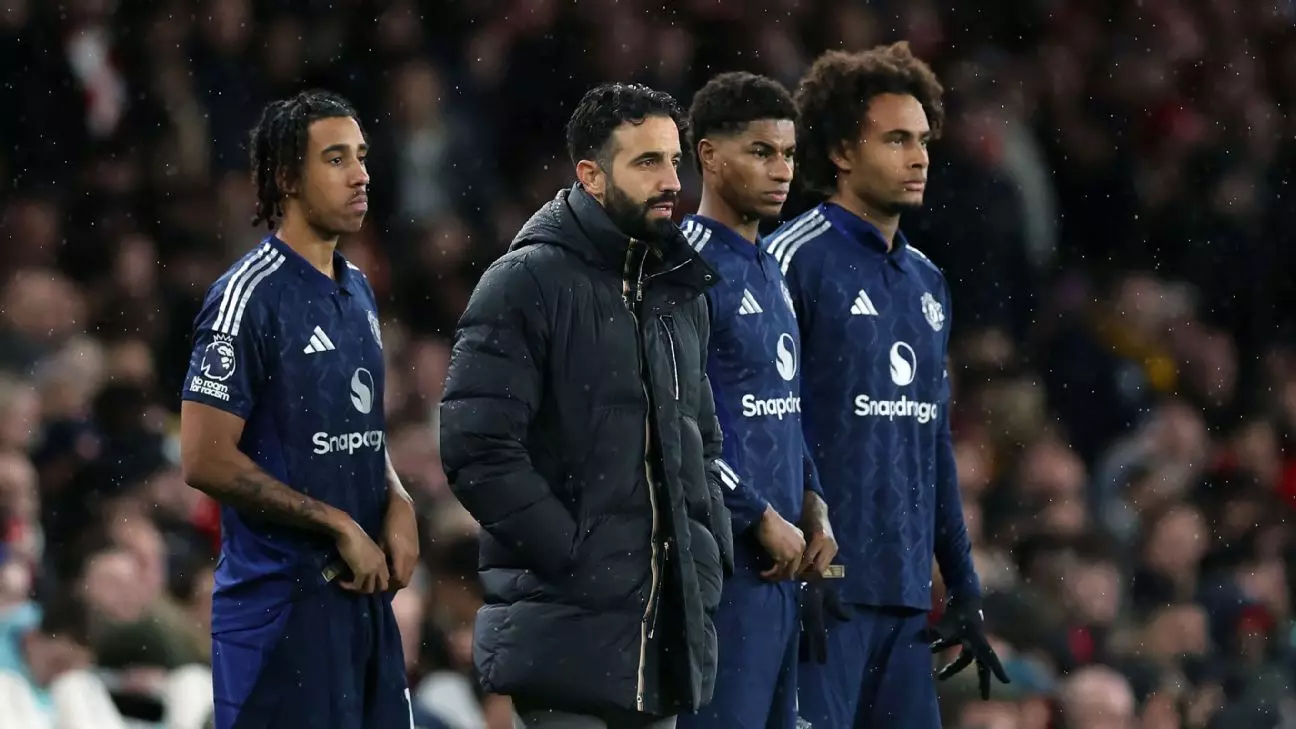Ruben Amorim’s tenure at Manchester United has begun amid intense scrutiny and significant injury challenges. Following his first league defeat—a 2-0 setback against Arsenal—he faces a dual challenge: the immediate pressure of results and the lengthy task of rebuilding a squad depleted by injury woes. To make matters more daunting, Amorim is tasked with returning the Red Devils to their former glory, a task that bears the weight of immense expectations from fans and the club’s hierarchy alike.
The match at the Emirates Stadium revealed the harsh realities impacting Amorim’s selections, chiefly the ongoing battle with player fitness. Harry Maguire, Mason Mount, and Tyrell Malacia, emerging from injuries, were each given limited time on the pitch, highlighting an urgent need for better squad depth and fitness management. This situation left Amorim with tough choices, which he described as enforced by “time limits” regarding player fitness. The introduction of Leny Yoro, who made his long-awaited debut after an extended recovery from a foot injury, further emphasizes a squad fraught with uncertainties regarding player availability.
While his selections might not have consisted of his preferred strategy, Amorim’s pragmatism shines through in his approach. He emphasizes the necessity of managing players’ workloads, particularly those returning from injury. His candid acknowledgment that the team can only compete effectively if all players are fit illustrates his commitment to not just winning games but also ensuring long-term player health. However, the constraints he faces draw a line between ambition and reality, where any slip-up can be costly.
Despite the disappointment of a loss, Amorim maintains a forward-looking perspective. His focus on evaluating player performances—independent of the final score—signals a maturity in understanding the overarching picture of team progression. Football is often seen as a results-oriented business; however, Amorim’s comments indicate a deeper appreciation for the developmental aspects of his players’ performances.
He pointed out the stirrings of competence during the game, noting that even in moments of strife, there were signs of potential. The atmosphere in the stadium, particularly during the latter stages of the first half, suggested that Arsenal players were put on the back foot. Such moments, while fleeting, give enough evidence for Amorim to assert that his philosophy may indeed yield success in due course. His emphasis on positive takeaways, regardless of results, could potentially steer the team toward improving all facets of their game rather than simply chasing victories.
Central to Amorim’s strategy is his commitment to player health, as seen in his handling of Luke Shaw’s ongoing recovery. Recognizing the importance of allowing Shaw the necessary time to regain his fitness after a prolonged calf issue highlights a compassionate approach. Amorim’s focus on physical control during training, while ensuring the player remains engaged and committed, suggests a fostering of loyalty and trust between the coach and his players.
Leaning on the importance of fitness management before tactical execution will be crucial in the coming weeks. Amorim’s strategy appears to be twofold: achieving competitive results now while sustaining a strategy for holistic player development. The dual focus can lay a strong foundation for the long-term revival of the Red Devils.
Amorim’s reign at Manchester United, although marred by injury setbacks, reflects a broader narrative that encompasses resilience, management of player fitness, and the challenge of achieving immediate results. As he navigates these complexities, Amorim’s capacity to maintain a clear vision amidst turbulence will determine not only his fate but that of the club in the years ahead. It’s a balancing act between protecting his players and delivering results, but with patience and careful management, the potential for revitalization exists. In a club as storied as United, the hope for a brighter tomorrow remains a constant beacon propelling the team forward.


Leave a Reply